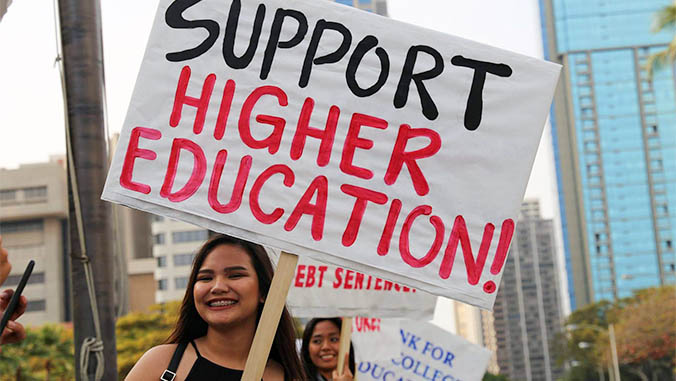

High school students in Hawaiʻi are earning college credits at rapidly rising rates thanks to a collaboration between the University of Hawaiʻi and the Hawaiʻi Department of Education called Early College, which offers the opportunity for students to take college courses at their high school and earn credit toward their high school graduation and college degree.
Many students earn these college credits at no cost. Early College has support from the state legislature (which provided the Hawaiʻi Department of Education with $1 million in Early College funding for the current school year and $1 million for the 2018–2019 school year). Supplemental funding has been provided by private and federal grants, many of which are accessed by public, charter or private schools offering Early College classes.
The number of UH’s Early College offerings at high school campuses has skyrocketed, from approximately eight classes during the 2012–2013 school year to more than 269 classes this academic year, a more than 33-fold increase.
“I think what’s great about Early College is that it can change students’ trajectories. It can make them realize that they can succeed in achieving a degree, and it can also give them real momentum when they do get to college to persist and graduate,” said Stephen Schatz, executive director for Hawaiʻi P–20 Partnerships for Education, an organization with the goal of having 55 percent of Hawaiʻi’s working age adults have a 2- or 4-year college degree by the year 2025 and a supporter of Early College work across the state.
Early College participants more likely to enroll in college
Student participation in dual credit programs, including Early College, has grown exponentially over the last six years. Only 5 percent of high school completers at public and charter schools (601 students) from the Class of 2011 graduated with dual credit—compared to 14 percent of high school completers (1,573 students) from the Class of 2016.
According to Hawaiʻi P–20, “National research and local data has shown that students who participate in Early College are more likely to enroll and persist in college. Dual credit programs are also particularly effective for economically disadvantaged students.”
Economically disadvantaged graduates with dual credit go to college at almost double the rate of those without dual credit. For the Class of 2016, the college enrollment rate for economically disadvantaged students in Hawaiʻi with dual credit is 72 percent, compared to 39 percent of economically disadvantaged students without dual credit.
Student earns associates degree while still attending high school
—By Kelli Trifonovitch

